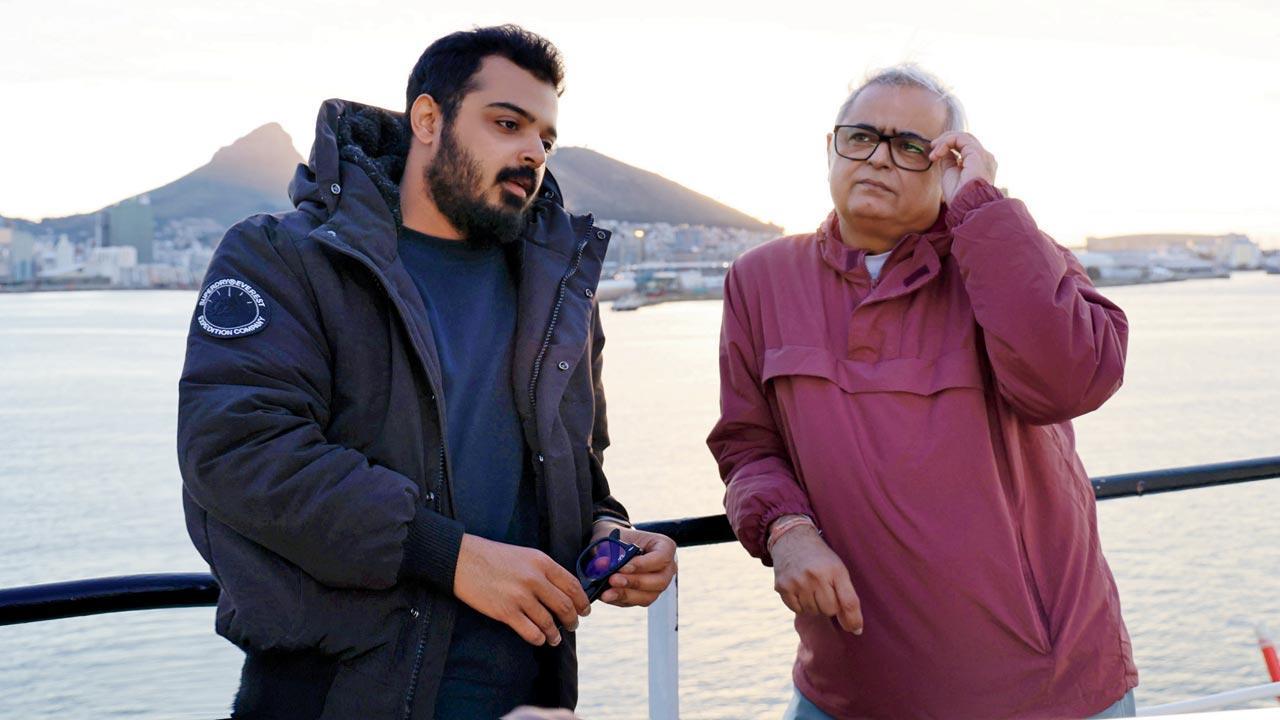His father’s early failure was a learning. The recent zip zap zoom to critical acclaim and fame has brought faith. Jai Mehta, who makes his solo directorial debut with Lootere, says like his father, he also believes giving up is not in the syllabus

Hansal and Jai Mehta
Disney’s mandate doesn’t allow the title of father on screen,” Hansal Mehta displays disarming candour as he opens up about his motivation to board son Jai’s latest directorial, Lootere, as showrunner. This is not the first time Jai has taken up director duties—he co-directed SonyLIV series Scam 1992 (2020) with Hansal, his director-producer father—but it’s the first time he is the captain of his ship, prompting senior Mehta’s emotional involvement.
“The only reason for me to be the showrunner was that it was Jai’s solo directorial. I have seen him in action before, but it was good to see him taking charge this time and not having to fight with me,” he chuckles. Before collaborating with his father on the web series, Jai served as associate director on several of his films, including Shahid, CityLights and Aligarh. This time, Mehta wasn’t instructing him.
“I was handling him. We served as a sponge for each other. When Shailesh [R Singh, show’s co-creator, co-writer and producer] had an issue and wanted to tell Jai something, he’d target me, because Jai would be at the shoot. He would call and scream. I would say, ‘Okay, okay. I will talk to Jai.’ Then I would convey the message to him, but in a different way. Similarly, if Jai was facing frustration, he couldn’t share it with his team; a director must keep the morale high. So, he too would come to me.”
 Lootere is about the passengers of an ill-fated ship been taken hostages by pirates off the coast of Somalia, and an unlikely hero steps forward to save them
Lootere is about the passengers of an ill-fated ship been taken hostages by pirates off the coast of Somalia, and an unlikely hero steps forward to save them
Jai doesn’t feel the difference, though. The roles might have changed, but his father’s unwavering support stands. “He has been supportive, including for my short films.. and I have made some terrible ones; some even I don’t have copies of,” he laughs.
Their filmmaking styles are different, but there’s much that they share in common as people. Like their ability to veil emotions as mature professionals. “I refer to him as Hansal Sir. The last time I called him on the phone and addressed him as ‘dad’, he asked, ‘Do you need money? What happened? Why are you calling me dad?’,” Jai says.
It can be attributed to the fact that their relationship has been built on film sets. To Hansal, their shared love for the movies is what makes them father and son. “We have spent more time on set than we have at home together. He was born when I was barely 23. I was searching for myself and in that search, I managed to find my son when I needed him, which was when he became assistant director. We have ended up discovering each other on set. We have spent the most intense times together and discovered each other as people, passionate about films and telling stories. So, it [cinema] keeps us together.”
Even before he joined his father on the set as assistant, Jai had developed an intimate connection with Mehta’s filmmaker self. He grew up watching a director failing with every movie and trying again. “A lot of people know of Hansal Mehta only after he made Shahid [2010]. He made six films before that. That’s something no one will talk about. Even he won’t,” Jai laughs, before adding, “I have two younger sisters. Their father is the director of Shahid, Citylights, Aligarh, Scam, Scoop. [But] the father I know is the director of Jayate, Dil Pe Mat Le Yaar, Chhal, three unreleased films. Of Raakh too. I grew up with that director.”
Shahid, a critically acclaimed film based on the life of lawyer and human rights activist Shahid Azmi, who was assassinated in 2010, it starred Rajkummar Rao, and brought Mehta the Best Director gong at the 2014 National Film Awards.
Evidently, it has not been easy. Mehta is the first in his family to take up filmmaking. “We aren’t film royalty,” Jai declares.
In a rare display of emotion, Mehta sounds poignant while painting a picture of Jai’s childhood and their journey as a family. “He has seen me through days that weren’t exactly ideal, struggling to find myself and keep our lives together. We were searching for a structure as family when things were going haywire. Jai has lived through the troubles of a slightly complicated childhood,” Mehta says. In a bid to snap out of this reflective moment, Jai quickly adds, “But there are no regrets. There’s only good from here on. You don’t look back. You think about all that you learnt and use that to do better.”
And the biggest learning from a challenging childhood is to never give up. “There was a time when he felt, ‘What am I doing?’ And he did take a break [from filmmaking] but ultimately, he returned and did Shahid, which took two years to make, and another year and a half to release. It was tough but he never stopped.”
 Subscribe today by clicking the link and stay updated with the latest news!" Click here!
Subscribe today by clicking the link and stay updated with the latest news!" Click here!










